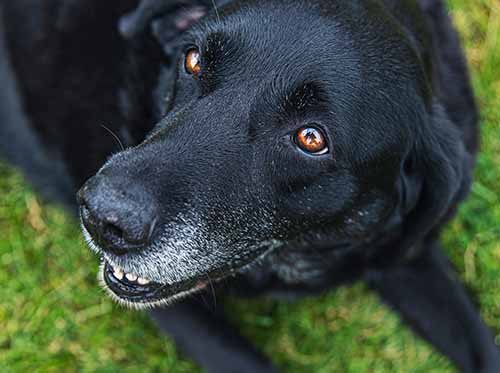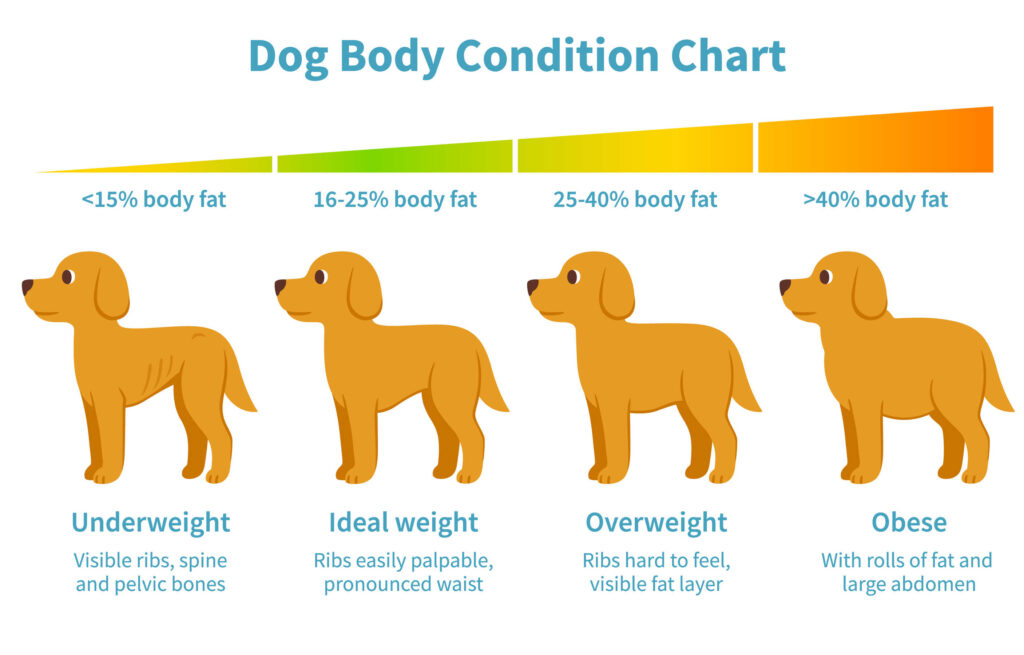
Dogs and humans can experience weight changes with age. Some dogs gain weight because they are less active and spend more time sleeping. However, other dogs lose weight with age.
Weight loss in senior dogs can have many potential causes. Decreased food intake often causes weight loss. Dental disease and cognitive dysfunction (like human dementia) can cause a dog to eat less, leading to weight loss.
In other cases, an older dog loses weight despite eating normally. Read on to learn more about how to help a senior dog that is losing weight despite a good appetite.

Is it normal for older dogs to lose weight – even when eating normally?
A small amount of weight loss can be expected in older dogs. Less activity can lead to a slight decrease in muscle mass. They may experience subtle changes in appetite and metabolism. If your dog loses over ten percent of their body weight, an underlying condition could be to blame.
Dogs differ significantly in their conformation and healthy weight, so it’s hard to determine how much a dog “should” weigh. It can also be challenging to weigh your dog at home accurately.
Instead, focus on your dog’s body condition. An ideal body should have a visible tuck at the waist and ribs that can be felt but not seen. If your dog becomes underweight, bony prominences (such as the ribs, pelvis, and spine), once covered by muscle or fat, may become increasingly visible. Your dog’s collar or harness may also become loose; this suggests that your dog’s weight loss could be problematic, and a veterinary visit is needed.
You should be concerned if your dog experiences rapid unintentional weight loss. A five percent loss can be worrying if it occurs unintentionally, over two weeks. Any dramatic weight change with no known inciting cause warrants a visit to your veterinarian.

What causes weight loss in older dogs who still eat well?
If your dog is losing weight despite a healthy appetite, there are several factors to consider.
Common causes of weight loss in older dogs with a good appetite include:
- Diabetes: Diabetic dogs do not process glucose effectively because of a lack of insulin production or a decreased response to insulin. These dogs eat normally or have an increased appetite but lose weight because glucose can’t move into their cells and tissues. Other signs of diabetes may include increased thirst and urination, weight loss, and susceptibility to infections.
- Cushing’s disease: This hormonal imbalance floods the body with excess levels of steroids. Affected dogs often take on a pot-bellied appearance; they lose muscle mass and weight overall. Other signs of Cushing’s disease may include increased appetite, increased thirst and urination, excessive panting, increased susceptibility to infection, and patchy hair loss.
- Inflammatory bowel disease (IBD): Intestinal inflammation interferes with a dog’s ability to absorb nutrients from their diet. Dogs with IBD may lose weight, despite eating normally. These dogs often have soft stool, and your veterinarian may notice decreased protein levels in the blood.
- Chronic kidney disease: Chronic kidney disease is a gradual loss of kidney function. The l causes interfere with the kidney’s ability to eliminate waste while retaining water and other vital substances. Many dogs with chronic kidney disease have a decreased appetite, but some lose weight despite a regular food intake. Other signs may include increased thirst and urination, nausea, vomiting, and diarrhea.
- Intestinal parasites: Intestinal parasites are not specifically an “older pet” problem but can lead to weight loss in dogs. Hookworms, roundworms, and whipworms live in the intestines, absorbing valuable nutrients. This primarily concerns those not receiving monthly heartworm prevention, which protects against intestinal worms.
- Cancer: Nearly 50% of dogs over ten years will develop cancer. Cancers affecting the gastrointestinal tract commonly cause weight loss and other gastrointestinal issues. Cancer in other body parts may lead to various signs, including visible lumps or swellings, limping, pain, and other changes. However, cancers affecting other sites in the body can lead to dramatic weight loss. This is referred to as “cancer cachexia,” occurring because of metabolic alterations caused by some cancerous tumors.
While these are significant causes of weight loss in older dogs eating well, other medical conditions may be involved.
Failure to treat these diseases can have severe consequences for your dog. Untreated Cushing’s disease and diabetes can lead to severe infections and organ failure. Inflammatory bowel disease can cause life-threatening malnourishment and effects, such as delayed wound healing. Intestinal parasites cause malnourishment; some intestinal parasites can cause significant blood loss and anemia. Chronic kidney disease and cancer may also be fatal, but early and effective treatment can significantly prolong your dog’s life.
Treatment options at the vet
Your veterinarian will perform a comprehensive physical examination and screening laboratory tests. Depending on the results, your veterinarian may recommend more specific testing such as blood tests, imaging, and other diagnostics.
Some causes of weight loss are treated with medication. Intestinal parasites are typically treated with two doses of dewormer, and your veterinarian will likely prescribe a monthly parasite preventative to prevent reinfection. This should cure your dog’s infection and prevent further problems.
Hormonal imbalances are treated with medication but not cured. Ongoing, lifelong treatment will be required. Diabetes mellitus is treated with twice-daily insulin injections to help regulate your dog’s glucose levels. Cushing’s disease is treated with oral medications to decrease overactive corticosteroid production. Both conditions will require continuous veterinary monitoring and care.
Inflammatory bowel disease and chronic kidney disease require more complex treatment. These conditions are treated with dietary changes, oral medications, and other interventions. Like Cushing’s disease or diabetes, these conditions are managed and not cured. Your dog will require ongoing veterinary care for the rest of their life.
Cancer treatment depends on the type of cancer that is identified. Cancer treatments may involve palliative care (designed to keep your dog comfortable), surgical tumor excision, chemotherapy, or radiation. Your veterinarian will speak to you about treatment options and your dog’s prognosis, helping you make the best decision for your dog.
When no underlying disease is found, your veterinarian will shift their focus from treating a disease to supporting your dog’s overall health as they age. Your veterinarian may recommend a specific diet to increase your dog’s caloric intake. This may be a high-calorie prescription diet or over-the-counter puppy food.
5 tips to help a senior dog who is losing weight despite eating well (at-home tips)
Consult your veterinarian if your dog is losing weight despite normal food intake.
Once your veterinarian has ruled out common conditions that can cause weight loss, consider dietary changes to increase your dog’s caloric intake.
- Consider a diet change. Senior diets are often lower in calories than regular adult dog food. Changing to a higher-calorie or over-the-counter puppy food may help your dog maintain weight.
- Offer larger or more frequent meals. Consider offering your dog ten to fifteen percent more food at each meal or adding one more meal daily.
- Spoil your dog with additional healthy treats. While treats should not comprise over ten percent of your dog’s diet, a few extra treats can help your dog maintain a healthy weight. Stick with healthy options and avoid fatty treats that can cause pancreatitis and other problems.
- Experiment with exercise. Exercise can burn calories but adds muscle mass. A change may promote weight gain, depending on your dog’s current activity level.
- See your veterinarian at least every six months. If your dog has an underlying medical condition, your veterinarian may recommend frequent check-ups.
With your veterinarian’s help, you can likely control your dog’s weight loss through medical treatments and dietary changes.
FAQs:
Do dogs get skinnier when they get old?
It’s common for dogs to lose weight as they age. If weight loss occurs slowly and gradually, it is not usually a cause for concern. Sudden or severe weight loss can indicate an underlying disease that requires treatment.
Is my dog suffering from a poor diet?
Ensure that your dog’s food is formulated to meet their nutritional needs. Look for a nutritional adequacy statement on the food label, showing it has been tested in food trials or developed to meet the needs of your dog’s specific life stage. Life stages in dogs include puppy, adult, and senior, with some foods formulated to meet the needs of “all life stages.”
At what age does a dog become a senior?
The age depends on their size. Larger breeds have shorter lifespans, becoming seniors earlier. Typically, large-breed dogs are considered seniors at seven years of age. Small breeds are not considered seniors until they are ten to twelve.
What are signs that a dog is dying of old age?
The signs associated with impending death vary depending on their underlying medical conditions. Everyday observations include dramatic loss of energy, decreased appetite, lack of water intake, lack of interest in social interactions, restlessness, and changes in consciousness.
What is the average weight for senior dogs?
Senior dogs’ weight commonly changes as they age. A senior dog at their ideal weight will have a thin covering of fat over their ribs; you should be able to feel the ribs but not see them from a distance.
Disclaimer: This website's content is not a substitute for veterinary care. Always consult with your veterinarian for healthcare decisions. Read More.


Be the first to comment